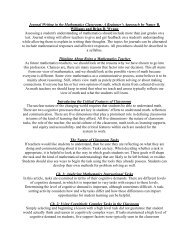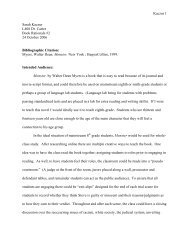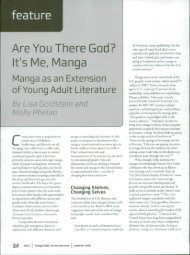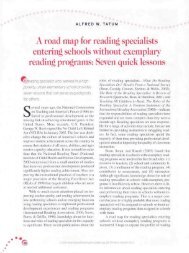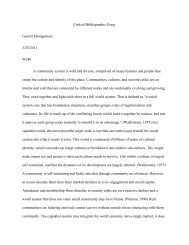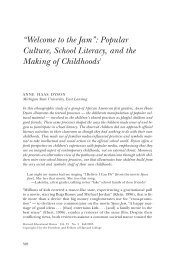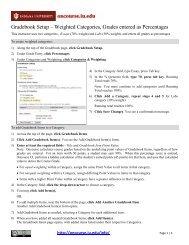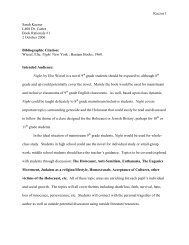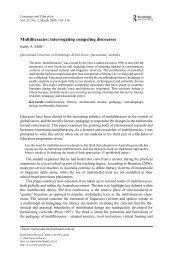McDonald 2004 Critical Reading 10-11 year olds.pdf - Oncourse
McDonald 2004 Critical Reading 10-11 year olds.pdf - Oncourse
McDonald 2004 Critical Reading 10-11 year olds.pdf - Oncourse
Create successful ePaper yourself
Turn your PDF publications into a flip-book with our unique Google optimized e-Paper software.
Literacy April <strong>2004</strong> 23<br />
of being for women might be realised. As the next part<br />
of Lesson 15 proceeded, however, the students<br />
struggled to come to terms with their own views of<br />
what alternatives ‘old ladies’ may take. This discussion<br />
is analysed next.<br />
Presenting an alternative (feminist)<br />
discourse<br />
In the final section of Lesson 15, the teacher drew<br />
attention to the ‘difference’ that the Blue Lady is, in<br />
contrast to the ‘traditional’ Mrs Watson. One student’s<br />
response, ‘‘She’s got no time for anything else, but for<br />
her art’’ (47S), stated a direct contrast to how Mrs<br />
Watson’s time is spent. This response was used by the<br />
teacher to initiate a lengthy discussion on the possibilities<br />
of a non-traditional and alternative lifestyle for<br />
women. The excerpts below record the essence of the<br />
discussion:<br />
46T . . . What about the Blue Lady, let’s come back<br />
to her in this conversation called ‘What makes<br />
the Blue Lady in this story different from the<br />
typical female characters we encounter?’ Sam?<br />
47S She’s got no time for anything else, but for her<br />
art.<br />
50T So her art occupies her whole life. Her art is her<br />
priority.<br />
...<br />
55S A hobby?<br />
56T Yeh but isn’t a definition of a hobby something<br />
that you do as a pleasure activity outside of<br />
work?<br />
57S Yeh, but she doesn’t have any work to do.<br />
...<br />
59S Well, dyeing her wool is the work she does, and<br />
the drawing is the hobby.<br />
60T Ok, let’s just talk about this aspect of ‘work’ at<br />
the moment. What are you going to say Jerry?<br />
61S What is dyeing if it’s not her work?<br />
62T . . . What else do you have to say about this?<br />
Nadine said ‘‘Well, it’s like her hobby cause she<br />
really hasn’t got a job’’. And yet, we’ve said that<br />
this occupies a huge percentage of her life. Jerry<br />
has said ‘‘Well if it is not her work, what is it?’’<br />
Hobbies and leisure pursuits are those things<br />
that we do in addition to work. They are little<br />
sidelines that give us pleasure. How would you<br />
describe what the Blue Lady does?<br />
63S It’s her work. (Lesson 15)<br />
In this classroom talk the teacher presented cultural<br />
and feminist positions. She attempted to establish the<br />
concepts that art is ‘work’, and that ‘art-as-work’ was<br />
an alternative to the domesticity of Mrs Watson. One<br />
interpretation of the teacher’s talk across 56T-62T is<br />
that she wanted the students to consider the Blue<br />
Lady’s occupations as serious, rather than trivial or<br />
marginal. This is evident in her comment ‘‘occupies a<br />
huge percentage of her life’’ (62T). The marginalised<br />
position of ‘art’, in the students’ view, is apparent in the<br />
definition of art as ‘a hobby’ (55S) and the comment<br />
‘‘but she doesn’t have any work to do’’ (57S) with the<br />
adversative ‘but’, used by both teacher and students to<br />
indicate the debate.<br />
The concept of art-as-work appears particularly to<br />
have challenged the students’ knowledge of ‘work’ as a<br />
money-earning occupation and the students’ comments<br />
now attempted to reconcile their understanding<br />
of work with the Blue Lady’s activities. This can be<br />
seen in the excerpt following:<br />
67S Probably, the art is like a job, she wants to be in<br />
the art gallery or like that?<br />
69S She might be getting an award cause then she<br />
can sell it and then she will have money.<br />
73S She’s talented in what she does. (Lesson 15)<br />
The tentativeness of the students’ acceptance of the<br />
teacher’s suggestion is evident in their use of modality<br />
‘probably’ (67S) and ‘might’ (69S) as they tried to<br />
explain to themselves, in practical ways, how art may<br />
equal work. This tentativeness was articulated as a<br />
frame clash for one student (indicated by a bold S in<br />
the following excerpt), who openly contested the<br />
‘truth’ of this premise. This resistance to a compliant<br />
reading of the alternative way of being put forward by<br />
the teacher, offered the other students the possibility of<br />
re-examining their experience of elderly women:<br />
79S<br />
80T<br />
81S<br />
94S<br />
98S<br />
<strong>11</strong>7S<br />
135S<br />
136SS<br />
138S<br />
140S<br />
I disagree with everyone – she doesn’t have any<br />
major priorities, but I just think it is something<br />
that she does just to fill up her time.<br />
Why would you say that?<br />
How do you know if she really enjoys it, how do<br />
you know that she doesn’t do it just cause she is<br />
bored?. . . .<br />
I don’t know . . . usually old ladies are sort of<br />
in the middle – some are secretive and some talk<br />
– usually most of them are in between, like they<br />
really talk and sometimes they are quiet cause<br />
my grandma sits for two hours and goes to sleep<br />
– but she also draws. . . .<br />
I don’t know if this is right – the Blue Lady is<br />
sort of like a younger person – she likes to draw<br />
and everything. My grandma is 90 and she is<br />
like Mrs. Watson, I don’t really know. . . .<br />
My grandma is exactly the same as the Blue<br />
Lady. She is 90 <strong>year</strong>s old, her husband’s dead,<br />
she’s an artist and she really likes children.<br />
...<br />
Again I disagree with everyone. Old individuals,<br />
they usually get shipped off to the old<br />
folk’s home.<br />
Objection! Objection! [general loud reaction]<br />
My grandmother was living in a flat by herself<br />
and she was crippled.<br />
Old people don’t live with anyone because<br />
sometimes they’re a bit bitter<br />
r UKLA 2003




